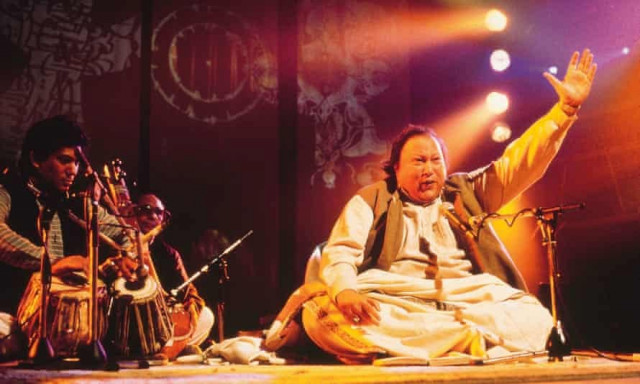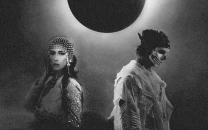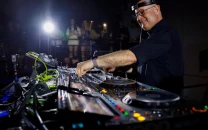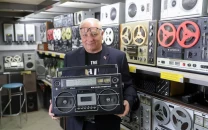King of Qawwali NFAK's anniversary celebrations muted out of respect for Ashura
24 years ago, the ‘Shahenshah-e-Qawwali’ died of a sudden cardiac arrest at Cromwell Hospital in London today.

Today marks 24 years since the ‘Shahenshah-e-Qawwali’ Ustad Nusrat Fateh Ali Khan bid farewell to this world after immortalizing himself through his music. Sargam Digital, the studio-cum-shrine where his voice still reverberates, honours the late maestro annually on August 16. However, the customary practice could not be carried out this year out of respect for Muharram.
Raza Shah, who helms the recording facility once owned by Khan, told The Express Tribune about how it misses his presence till this day. How Khan, who’d often sleep in the studio, only to wake up and spell magic with his gifts, is etched in the memory of its inhabitants.
The escape
"Every year, we dedicate this month to honour the late NFAK, because of whom this studio still exists. We invite veteran artistes, Khan’s friends and hold a prayer ceremony. But this year, his death anniversary arrived in the wake of Muharram, so we decided not to host anything,” Shah disclosed. “But it goes without saying that we missed him greatly and with his splendid work at our disposal, we treasure him daily,” he added.
Sargam Studio, was set up by the renowned Qawwal in 1983, as one walks into the studio — still home to the instruments and equipment once used by Khan — the space immediately strikes a chord that plucks at the memory of a man who serenaded us with his melodious voice. Khan used the studio at the peak of his career, recording some of his most eminent Qawwalis including the famous Ali Da Malang here. Not all that he recorded, however, was released during his lifetime. In fact, some unreleased recordings are still said to be tucked away safely within the confines of the space.
Veteran songwriter Altaf Bajwa, who is a regular attendee at Sargam Studio’s annual events, went on to add, “I make it a point to attend the ceremony at Sargam studio every year. The event is always a stark reminder of what a legend NFAK sahab was. But we said our prayers at home this year owing to the delicacy of the situation.”
24 years ago, Khan was taken ill with kidney and liver failure on August 11, 1997 in London, England. While, on the way to Los Angeles in order to receive a kidney transplant, he died of a sudden cardiac arrest at Cromwell Hospital in London on August 16, 1997 at the age of 48.
The legacy
Born in Faisalabad on October 13, 1948, Khan was undoubtedly the greatest Qawwal this world has ever seen. It was due to his efforts and collaborations with various Western artistes that Qawwali became a popular genre globally.
His first public performance was a studio recording broadcast as part of an annual music festival organised by Radio Pakistan, known as Jashn-e-Baharan. Khan sang mainly in Urdu, Punjabi and occasionally in Persian, Brajbhasha and Hindi.
He teamed with Peter Gabriel on the soundtrack of The Last Temptation of Christ in 1985, with Canadian musician Michael Brook on the albums Mustt Mustt (1990) and Night Song (1996) and with Pearl Jam lead singer Eddie Vedder in 1995 on two songs for the soundtrack to Dead Man Walking. He also contributed to the soundtrack of Natural Born Killers.
His album Intoxicated Spirit was nominated for a Grammy award in 1997 for best traditional folk album. According to the Guinness Book of World Records, Khan holds the world record for the largest recorded output by a Qawwali artist; a total of 125 albums as of 2001.
TIME magazine's issue of November 6, 2006, ‘60 Years of Asian Heroes’, lists Nusrat as one of the top 12 Artists and Thinkers of the prior 60 years. Five documentaries have also been made on him.
In memoriam
Remembering the late legend, South Asian Classical singer Hussain Bakash Gulu remarked, “Khan was enriched with a beautiful voice and peoples were in love. He is one of the few Qawwals whose popularity only increased after his death and is increasing till this day as a slew of new generation musicians from around the globe listen to his music for inspiration. He was a blessing for the country and also for the music industry.”
Qawwals Shair ali and Mahar Ali also lamented, "No such Qawwal can ever come again, Nusrat was the only one. His family was a big gharana and no Qawwal in Qawwali’s history can ever match up to him.”
Have something to add to the story? Share it in the comments below.



















COMMENTS
Comments are moderated and generally will be posted if they are on-topic and not abusive.
For more information, please see our Comments FAQ